16 nov 2017
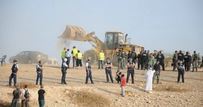
Israeli gunboats on Thursday morning opened machinegun fire at Palestinian fishermen and their boats off the northwestern shores of Gaza City.
Local sources reported that Israeli gunboats randomly opened fire around fishing boats and chased them off the coast of al-Sudaniya area west of Gaza City.
Luckily, no one was injured in the shooting attack, but the intensity of gunfire forced all fishermen to stop working and go ashore.
Israeli gunboats are around Gaza fishermen almost every day, harassing them, shooting at them, damaging their boats, and making arrests. Sometimes fishermen are injured or killed during gunfire attacks.
Under the 1993 Oslo accords, Palestinian fishermen are permitted to fish up to 20 nautical miles off the coast of Gaza. Over the past 18 years, however, Israel has reduced the fishing area gradually to a limit of three nautical miles as part of its blockade on Gaza.
But fishermen and human rights groups say that, since the 2008-09 war in Gaza, the Israeli navy has been regularly enforcing a limit even closer to the shore.
Local sources reported that Israeli gunboats randomly opened fire around fishing boats and chased them off the coast of al-Sudaniya area west of Gaza City.
Luckily, no one was injured in the shooting attack, but the intensity of gunfire forced all fishermen to stop working and go ashore.
Israeli gunboats are around Gaza fishermen almost every day, harassing them, shooting at them, damaging their boats, and making arrests. Sometimes fishermen are injured or killed during gunfire attacks.
Under the 1993 Oslo accords, Palestinian fishermen are permitted to fish up to 20 nautical miles off the coast of Gaza. Over the past 18 years, however, Israel has reduced the fishing area gradually to a limit of three nautical miles as part of its blockade on Gaza.
But fishermen and human rights groups say that, since the 2008-09 war in Gaza, the Israeli navy has been regularly enforcing a limit even closer to the shore.

Israeli forces have taken new security measures in preparation for any escalation in the situation with the Islamic Jihad movement. Israel is expecting that the group will avenge the bombing of a tunnel in Gaza, two weeks ago, in which 12 militants of Islamic Jihad and Hamas were killed, according to Haartez.
These measures included the deployment of anti-rocket Iron Dome batteries in the Gush Dan settlement bloc, but not the calling up of reservists. The Israeli army has also decided to close three tourist areas close to the border fence, in order to prevent the possibility of snipers coming from the Strip.
PNN further reports that, after Israeli Forces had allowed farmers to work in the fields close to the fence, they changed the regulations, allowing each farmer to work individually according to a schedule and in places where they were allowed to enter.
It is estimated that if the Islamic Jihad does not succeed in carrying out an attack from the West Bank, it may attack from within the Strip.
The expectation is that the Islamic Jihad Movement wants to show that it will respond to the tunnel bombing, but in a way that will not disturb Hamas in the reconciliation process with the PA.
The decision to deploy the iron dome also stems from Israel’s willingness to prepare for a further escalation if Israel decides to act exceptionally in response to any Islamic Jihad retaliation.
This is the first time such measures were taken since the 2014 Gaza war ended.
These measures included the deployment of anti-rocket Iron Dome batteries in the Gush Dan settlement bloc, but not the calling up of reservists. The Israeli army has also decided to close three tourist areas close to the border fence, in order to prevent the possibility of snipers coming from the Strip.
PNN further reports that, after Israeli Forces had allowed farmers to work in the fields close to the fence, they changed the regulations, allowing each farmer to work individually according to a schedule and in places where they were allowed to enter.
It is estimated that if the Islamic Jihad does not succeed in carrying out an attack from the West Bank, it may attack from within the Strip.
The expectation is that the Islamic Jihad Movement wants to show that it will respond to the tunnel bombing, but in a way that will not disturb Hamas in the reconciliation process with the PA.
The decision to deploy the iron dome also stems from Israel’s willingness to prepare for a further escalation if Israel decides to act exceptionally in response to any Islamic Jihad retaliation.
This is the first time such measures were taken since the 2014 Gaza war ended.
15 nov 2017
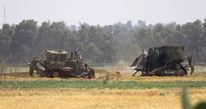
Israeli Occupation Forces (IOF) on Wednesday morning advanced into Palestinian lands to the east of Rafah, in southern Israeli-besieged Gaza Strip.
The PIC reporter said that four Israeli military bulldozers advanced into lands to the east of Rafah for a limited distance estimated at 50-100 meters.
The Israeli bulldozers escorted by armored vehicles advanced into the border line and leveled lands in the area.
In a similar context, Israeli naval gunboats opened fire at Palestinian fishermen at sea off the northern Gaza shores forcing them to return ashore. No casualties have been reported.
The PIC reporter said that four Israeli military bulldozers advanced into lands to the east of Rafah for a limited distance estimated at 50-100 meters.
The Israeli bulldozers escorted by armored vehicles advanced into the border line and leveled lands in the area.
In a similar context, Israeli naval gunboats opened fire at Palestinian fishermen at sea off the northern Gaza shores forcing them to return ashore. No casualties have been reported.
14 nov 2017

The Islamic Jihad Movement on Tuesday said that it will not give up its right to respond to the latest Israeli aggression that targeted a resistance tunnel east of Khan Younis in the southern Gaza Strip.
The Islamic Jihad leader Khader Habib denounced the recent statements made by the US envoy to the Middle East, Jason Greenblatt, in which he warned the Islamic Jihad against responding to the Israeli tunnel attack that killed 12 resistance fighters from al-Qassam and al-Quds Brigades.
Habib in press statements accused the US administration of being blatantly biased toward the Israeli occupation and condemned the Palestinian Authority's silence vis-à-vis the Israeli repeated aggressions on the Palestinian people in the Gaza Strip.
In his comment on the Islamic Jihad's threats to respond to the Gaza tunnel attack, Greenblatt said that such statements and actions are "harmful" to the Gazan people.
The Islamic Jihad leader Khader Habib denounced the recent statements made by the US envoy to the Middle East, Jason Greenblatt, in which he warned the Islamic Jihad against responding to the Israeli tunnel attack that killed 12 resistance fighters from al-Qassam and al-Quds Brigades.
Habib in press statements accused the US administration of being blatantly biased toward the Israeli occupation and condemned the Palestinian Authority's silence vis-à-vis the Israeli repeated aggressions on the Palestinian people in the Gaza Strip.
In his comment on the Islamic Jihad's threats to respond to the Gaza tunnel attack, Greenblatt said that such statements and actions are "harmful" to the Gazan people.

The Israeli occupation forces (IOF) on Tuesday evening launched a limited incursion into Palestinian lands north of Beit Lahia city in the northern Gaza Strip.
The PIC reporter said that four IOF bulldozers rolled into northern Beit Lahia and started razing Palestinian lands there under the protection of military vehicles stationed behind the border fence separating the Gaza Strip from the 1948 occupied Palestinian territories.
Incursions and shooting attacks are carried out by the Israeli forces every now and then in the eastern parts of the Gaza Strip in violation of the Egypt-sponsored ceasefire agreement signed in the wake of the 2014 aggression on the besieged enclave.
The PIC reporter said that four IOF bulldozers rolled into northern Beit Lahia and started razing Palestinian lands there under the protection of military vehicles stationed behind the border fence separating the Gaza Strip from the 1948 occupied Palestinian territories.
Incursions and shooting attacks are carried out by the Israeli forces every now and then in the eastern parts of the Gaza Strip in violation of the Egypt-sponsored ceasefire agreement signed in the wake of the 2014 aggression on the besieged enclave.

A number of Iron Dome missile defense batteries were deployed in central Israel on Monday by the Israeli army, amid heightened tensions with the Palestinian Islamic Jihad since the army blew up the group’s resistance tunnel last month.
The Israeli occupation army confirmed the anti-missile systems had been installed in central Israel. On Sunday Iron Dome batteries were spotted on the outskirts of Occupied Jerusalem allegedly in anticipation of retaliation attacks by the Palestinian resistance.
The occupation army claimed that the Iron Dome system, which is designed to shoot down short-range rockets and, in some cases, mortars, was deployed to counter the threats made by the Palestinian Islamic Jihad resistance group, which has vowed to avenge its members killed in the tunnel blast.
Over recent days, the Israeli army threatened that any response by the Islamic Jihad will be met with a powerful and determined Israeli aggression, not only against the Jihad, but also against Hamas.
The Palestinian Islamic Jihad responded to the threats, saying the Israeli threats against its leaders constituted “an act of war,” and vowing to continue to try to carry out a revenge attack against Israel.
Islamic Jihad said it would not back down on its right to retaliate against Israel for the deadly strike, which took away the lives of 12 members of the group’s militants and of Hamas’s armed wing.
An Israeli military analyst dubbed the wrangle “a war of nerves”, saying at a time when the Israeli army has been pressuring the Islamic Jihad to backtrack on retaliation, the latter sees revenge as the most urgent of all steps.
The Israeli occupation army confirmed the anti-missile systems had been installed in central Israel. On Sunday Iron Dome batteries were spotted on the outskirts of Occupied Jerusalem allegedly in anticipation of retaliation attacks by the Palestinian resistance.
The occupation army claimed that the Iron Dome system, which is designed to shoot down short-range rockets and, in some cases, mortars, was deployed to counter the threats made by the Palestinian Islamic Jihad resistance group, which has vowed to avenge its members killed in the tunnel blast.
Over recent days, the Israeli army threatened that any response by the Islamic Jihad will be met with a powerful and determined Israeli aggression, not only against the Jihad, but also against Hamas.
The Palestinian Islamic Jihad responded to the threats, saying the Israeli threats against its leaders constituted “an act of war,” and vowing to continue to try to carry out a revenge attack against Israel.
Islamic Jihad said it would not back down on its right to retaliate against Israel for the deadly strike, which took away the lives of 12 members of the group’s militants and of Hamas’s armed wing.
An Israeli military analyst dubbed the wrangle “a war of nerves”, saying at a time when the Israeli army has been pressuring the Islamic Jihad to backtrack on retaliation, the latter sees revenge as the most urgent of all steps.
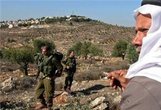
Israeli forces opened fire at Palestinian agricultural lands in the eastern part of the Khan Younis district, in the southern Gaza Strip, on Monday morning.
Witnesses told Ma’an News Agency that Israeli forces opened fire from inside the border fence. No injuries were reported.
Israeli military incursions inside the besieged Gaza Strip and near the “buffer zone,” which lies on both land and sea sides of Gaza, have long been a near-daily occurrence.
The Israeli army also regularly detains and opens fire on unarmed Palestinian fishermen, shepherds, and farmers along the border areas if they approach the buffer zone, as the authorities have not made clear the precise area of the designated zone.
The practice has in effect destroyed much of the agricultural and fishing sector of the blockaded coastal enclave, which has been under an Israeli air, land, and sea blockade for 10 years.
Witnesses told Ma’an News Agency that Israeli forces opened fire from inside the border fence. No injuries were reported.
Israeli military incursions inside the besieged Gaza Strip and near the “buffer zone,” which lies on both land and sea sides of Gaza, have long been a near-daily occurrence.
The Israeli army also regularly detains and opens fire on unarmed Palestinian fishermen, shepherds, and farmers along the border areas if they approach the buffer zone, as the authorities have not made clear the precise area of the designated zone.
The practice has in effect destroyed much of the agricultural and fishing sector of the blockaded coastal enclave, which has been under an Israeli air, land, and sea blockade for 10 years.
11 nov 2017
|
|
“I want to change my perspective, go and see different places in the world,” says Ezz Zanoun, a Palestinian photographer in Gaza.
In 2006, Ezz witnessed his brother Mohammad, a photographer, get hit by an Israeli missile that exploded 10 meters from him. Mohammad was severely injured, but eventually recovered. The incident motivated Ezz to pick up the camera and start taking pictures. He photographs Israeli assaults on Gaza, but also daily life, hardship and beauty in the Strip. “Although we are tied up and besieged, and every day I’m personally affected by the siege,” Ezz says, “we keep fighting to tell people the truth.” |
While he is grounded in Gaza, Ezz adds, “My pictures get to travel around the world every day.”
9 nov 2017

by Jaclynn Ashly, Al Jazeera/Days of Palestine
Human rights groups have condemned an Israeli decision to withhold bodies of five Palestinians who were killed in an Israeli attack on a tunnel dug under the Gaza-Israel border, last week.
Israeli authorities announced, on Sunday, that the army had uncovered the bodies of the five men – identified by Islamic Jihad as Alaa Abu Ghorab, Shadi al-Hamri, Bader Musabah, Ahmad al-Sabakhi and Mohammad al-Buhaisi – who were missing since last week, when Israel blew up a tunnel on the Gaza-Israel border, killing 12 Palestinians.
Initially, the five were believed to still be alive. However, rescue teams in Gaza were prevented by the Israeli army from carrying out a search campaign until advances were made for the return of missing Israelis held by Hamas – most notably Israeli soldiers Hadar Goldin and Oron Shaul, who are believed to have been killed during Israel’s offensive on the besieged enclave in 2014.
After Islamic Jihad declared that the missing five were dead, Israel discovered their bodies and announced that their remains would be withheld from the families.
Rights groups Adalah and the Al-Mezan Center for Human Rights released a joint statement on Sunday night, saying that the families of the Islamic Jihad members still “maintain their right to demand the return of the bodies of their relatives for burial”.
Israel’s policy of holding bodies “contradicts the principles of international law,” the groups stated. “Bodies of individuals who are killed during situations of conflict must be returned to their families for burial with dignity”.
‘Collective punishment’
According to Palestinian human rights group al-Haq, Israel has held more than 161 slain Palestinians from their families since 2015, nine of whom continue to be held. After the confiscation of the remains of the Islamic Jihad members, this number has increased to 14.
In addition, hundreds of Palestinians are believed to be buried in Israel’s “cemetery of numbers” – graves in Israel marked only by numbers.
In September four bodies held by Israel were buried there, despite an ongoing appeal in the Israeli Supreme Court demanding that Israel release the bodies.
Israel withholds the bodies of slain Palestinians in order to use as bargaining chips in future negotiations with Palestinian leaders.
Jonathan Conricus, the Lieutenant Colonel of the Israeli army, told Al Jazeera that despite Israel being “prepared” for a conflict, “we do not aspire to escalate the situation. We want to preserve stability for the Israeli population and for those in Gaza”.
Conricus added that there was “no direct relationship” between holding the bodies of the slain Islamic Jihad members and the army’s purported aim of preserving peace.
However, senior Islamic Jihad member Ahmed al-Mudallal feels differently, telling Al Jazeera that the group is “considering its options” against Israel. “We will not accept Israel’s blackmail”, he said, and vowed to use any means necessary to ensure the return of the bodies.
He added that Israel “would not be holding the bodies for long”.
“Israel fully understands the importance of burial rituals in Palestinian societies, whether it be for Christians or Muslims,” Dawoud Yusef, advocacy coordinator for prisoners’ rights group Addameer, told Al Jazeera.
Israel’s policy of holding slain Palestinian bodies “seeks to punish the families of those engaged in any resistance activities,” he said. “It doesn’t matter what these people were doing, the families still have the right to give them a burial”.
He added that the group considers Israel’s policy a form of “collective punishment” and a serious violation of international law.
Human rights groups have condemned an Israeli decision to withhold bodies of five Palestinians who were killed in an Israeli attack on a tunnel dug under the Gaza-Israel border, last week.
Israeli authorities announced, on Sunday, that the army had uncovered the bodies of the five men – identified by Islamic Jihad as Alaa Abu Ghorab, Shadi al-Hamri, Bader Musabah, Ahmad al-Sabakhi and Mohammad al-Buhaisi – who were missing since last week, when Israel blew up a tunnel on the Gaza-Israel border, killing 12 Palestinians.
Initially, the five were believed to still be alive. However, rescue teams in Gaza were prevented by the Israeli army from carrying out a search campaign until advances were made for the return of missing Israelis held by Hamas – most notably Israeli soldiers Hadar Goldin and Oron Shaul, who are believed to have been killed during Israel’s offensive on the besieged enclave in 2014.
After Islamic Jihad declared that the missing five were dead, Israel discovered their bodies and announced that their remains would be withheld from the families.
Rights groups Adalah and the Al-Mezan Center for Human Rights released a joint statement on Sunday night, saying that the families of the Islamic Jihad members still “maintain their right to demand the return of the bodies of their relatives for burial”.
Israel’s policy of holding bodies “contradicts the principles of international law,” the groups stated. “Bodies of individuals who are killed during situations of conflict must be returned to their families for burial with dignity”.
‘Collective punishment’
According to Palestinian human rights group al-Haq, Israel has held more than 161 slain Palestinians from their families since 2015, nine of whom continue to be held. After the confiscation of the remains of the Islamic Jihad members, this number has increased to 14.
In addition, hundreds of Palestinians are believed to be buried in Israel’s “cemetery of numbers” – graves in Israel marked only by numbers.
In September four bodies held by Israel were buried there, despite an ongoing appeal in the Israeli Supreme Court demanding that Israel release the bodies.
Israel withholds the bodies of slain Palestinians in order to use as bargaining chips in future negotiations with Palestinian leaders.
Jonathan Conricus, the Lieutenant Colonel of the Israeli army, told Al Jazeera that despite Israel being “prepared” for a conflict, “we do not aspire to escalate the situation. We want to preserve stability for the Israeli population and for those in Gaza”.
Conricus added that there was “no direct relationship” between holding the bodies of the slain Islamic Jihad members and the army’s purported aim of preserving peace.
However, senior Islamic Jihad member Ahmed al-Mudallal feels differently, telling Al Jazeera that the group is “considering its options” against Israel. “We will not accept Israel’s blackmail”, he said, and vowed to use any means necessary to ensure the return of the bodies.
He added that Israel “would not be holding the bodies for long”.
“Israel fully understands the importance of burial rituals in Palestinian societies, whether it be for Christians or Muslims,” Dawoud Yusef, advocacy coordinator for prisoners’ rights group Addameer, told Al Jazeera.
Israel’s policy of holding slain Palestinian bodies “seeks to punish the families of those engaged in any resistance activities,” he said. “It doesn’t matter what these people were doing, the families still have the right to give them a burial”.
He added that the group considers Israel’s policy a form of “collective punishment” and a serious violation of international law.
8 nov 2017

The Israeli army has intensified presence along Gaza’s border fence, declaring the area a closed military zone.
Southern Command chief Maj. Gen. Eyal Zamir gave instructions to ban farmers and settlers from coming within the reach of the border area and the adjacent ranches.
Zamir also notified Israeli settlers of the ban and ordered that works for the construction of an apartheid wall around Gaza’s tunnels be momentarily halted.
He said the decision comes in response to warnings over projected attacks against Israeli soldiers following last week’s Israeli strike on a Palestinian resistance tunnel south of Gaza Strip.
Southern Command chief Maj. Gen. Eyal Zamir gave instructions to ban farmers and settlers from coming within the reach of the border area and the adjacent ranches.
Zamir also notified Israeli settlers of the ban and ordered that works for the construction of an apartheid wall around Gaza’s tunnels be momentarily halted.
He said the decision comes in response to warnings over projected attacks against Israeli soldiers following last week’s Israeli strike on a Palestinian resistance tunnel south of Gaza Strip.
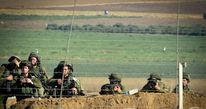
The Israeli occupation forces (IOF), on Wednesday morning, opened fire at Palestinian fishermen and farmers in Gaza Strip.
According to rights sources, Israeli war boats opened fire at a Palestinian fishing boat after surrounding it for more than an hour off the northern shores of Gaza.
Material damage was caused during the attack, while luckily no injuries were reported.
Meanwhile, Israeli forces opened their machinegun fire at Palestinian farmers east of al-Maghazi refugee camp in the central Gaza Strip.
No injuries were reported during the shooting attack.
Under an inhumane siege, the Israeli army keeps attacking, injuring and killing civilians, farmers and fishermen in Gaza almost on a daily basis, without any shred of respect for the Egyptian-brokered ceasefire deal in the besieged enclave or even the international law.
According to rights sources, Israeli war boats opened fire at a Palestinian fishing boat after surrounding it for more than an hour off the northern shores of Gaza.
Material damage was caused during the attack, while luckily no injuries were reported.
Meanwhile, Israeli forces opened their machinegun fire at Palestinian farmers east of al-Maghazi refugee camp in the central Gaza Strip.
No injuries were reported during the shooting attack.
Under an inhumane siege, the Israeli army keeps attacking, injuring and killing civilians, farmers and fishermen in Gaza almost on a daily basis, without any shred of respect for the Egyptian-brokered ceasefire deal in the besieged enclave or even the international law.
6 nov 2017

Head of the Gaza Fishermen Syndicate, Amjad al-Shrafi, said that the Israeli navy on Monday arrested two Palestinian fishermen off northern Gaza shore, seized their boat, and took them to an unknown destination, according to Wafa.
Shrafi added that the two fishermen, Hasan and Ahmad Miqdad, were injured while being chased by the Israeli navy forces.
Activist Zakaria Baker said that the Israeli navy gunboats on Monday afternoon confiscated Hasan Miqdad's fishing boat and arrested him along with his brother Ahmad off the coast of al-Sudaniyya area in the northern Gaza Strip.
Quds Press reported, quoting Baker, that the attack was accompanied by heavy firing of live bullets.
The Israeli navy's daily targeting of Gazan fishermen has not stopped even after the signing of the Egypt-sponsored ceasefire agreement between the Palestinian resistance and the Israeli occupation on 26th August 2014.
Nearly 125 Palestinian fishermen were arrested in 2016. Three fishermen were detained after being shot. Two fishermen were killed during the same year, one of whom is still missing, and dozens were injured.
Shrafi added that the two fishermen, Hasan and Ahmad Miqdad, were injured while being chased by the Israeli navy forces.
Activist Zakaria Baker said that the Israeli navy gunboats on Monday afternoon confiscated Hasan Miqdad's fishing boat and arrested him along with his brother Ahmad off the coast of al-Sudaniyya area in the northern Gaza Strip.
Quds Press reported, quoting Baker, that the attack was accompanied by heavy firing of live bullets.
The Israeli navy's daily targeting of Gazan fishermen has not stopped even after the signing of the Egypt-sponsored ceasefire agreement between the Palestinian resistance and the Israeli occupation on 26th August 2014.
Nearly 125 Palestinian fishermen were arrested in 2016. Three fishermen were detained after being shot. Two fishermen were killed during the same year, one of whom is still missing, and dozens were injured.
5 nov 2017
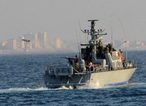
The Israeli navy fired, on Sunday at dawn, one shell at the shore of the al-Waha area, northwest of Gaza city, while military bulldozers continued digging border areas, north of Khan Younis, in the southern part of the coastal region.
The WAFA Palestinian News Agency said the navy fired one shell into at fishing boats in the al-Waha area, forcing the fishermen away, in fear of additional Israeli escalation.
The fishing boats were close to the shore, while the fishermen were preparing to sail to fish and provide for their families.
In related news, large armored bulldozers and diggers, continued bulldozing of lands, near the border fence, northeast of the al-Qarara town, north of Khan Younis, while military drones flew overhead.
The bulldozing was initiated several days ago, after the army bombarded a border tunnel, last Monday, leading to the death of at least twelve Palestinian fighters, while many more are believed to be dead, under the rubble, especially since Israel is refusing to allow search and rescue teams from crossing the border fence.
The WAFA Palestinian News Agency said the navy fired one shell into at fishing boats in the al-Waha area, forcing the fishermen away, in fear of additional Israeli escalation.
The fishing boats were close to the shore, while the fishermen were preparing to sail to fish and provide for their families.
In related news, large armored bulldozers and diggers, continued bulldozing of lands, near the border fence, northeast of the al-Qarara town, north of Khan Younis, while military drones flew overhead.
The bulldozing was initiated several days ago, after the army bombarded a border tunnel, last Monday, leading to the death of at least twelve Palestinian fighters, while many more are believed to be dead, under the rubble, especially since Israel is refusing to allow search and rescue teams from crossing the border fence.
Truce violations List of names Pictures of martyrs
Days: Aug: 26 - 25 - 24 - 23 - 22 - 21 - 20 - 19 - 18 - 17 - 16 - 15 - 14 - 13 - 12 - 11 - 10 - 9 - 8 - 7 - 6 - 5 - 4 - 3 - 2 - 1
July: 31 - 30 - 29 - 28 - 27 - 26 - 25 - 24 - 23 - 22 - 21 - 20 - 19 - 18 - 17 - 16 - 15 - 14 - 13 - 12 - 11 - 10 - 9 - 8
